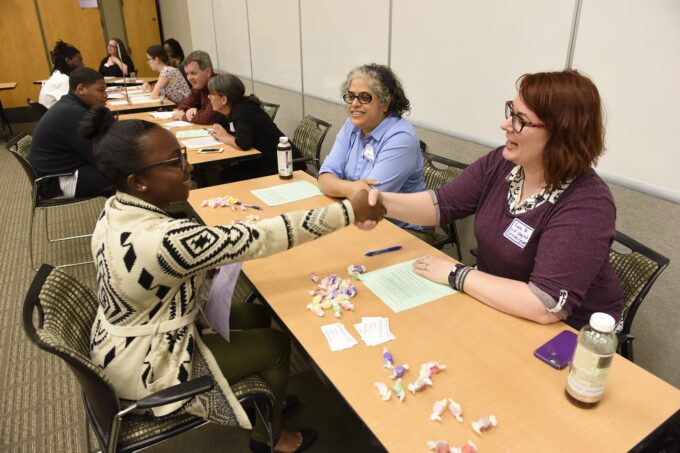Summer Jobs for Youth Success

University of Michigan partners with Washtenaw County on Summer17 Youth Employment Program
For young people today, the job market is more competitive and challenging now than in previous generations. Employers have high expectations and an increasing demand for more education and skills. As a result, young people — especially those lacking access to quality education and reliable job training — find it hard to gain access to jobs, let alone thrive in the workforce.
 Large disparities in education and economic outcomes persist for youth from different parts of the nation, and the same is true for some of the University of Michigan’s surrounding areas in Washtenaw County. Summer jobs programs for at-risk-youth can close these gaps. Such programs can provide income for youth and their families, provide structured summer activities, improve later academic performance and reduce criminal activity.
Large disparities in education and economic outcomes persist for youth from different parts of the nation, and the same is true for some of the University of Michigan’s surrounding areas in Washtenaw County. Summer jobs programs for at-risk-youth can close these gaps. Such programs can provide income for youth and their families, provide structured summer activities, improve later academic performance and reduce criminal activity.
WASHTENAW COUNTY SUMMER17 YOUTH EMPLOYMENT PROGRAM EXPANDS TO THE UNIVERSITY OF MICHIGAN
This summer, the University of Michigan will pilot an on-campus Summer Youth Employment Program, in partnership with Washtenaw County’s Summer 17 employment program, to pair youth with faculty and staff to help them gain work experience, mentorship, and life skills training. Youth will be placed in a variety of jobs across the scope of the U-M enterprise, to allow understanding of the impact of the nature of the work on outcomes.
 The Summer Youth Job Program (Summer17) was started by Washtenaw County last year and this summer, U-M is coming on board as an employer. Last year, 26 businesses employed and mentored 50 youth who gained meaningful work experience and income through the Washtenaw County program. Through this partnership, we have doubled the number of jobs available to youth.
The Summer Youth Job Program (Summer17) was started by Washtenaw County last year and this summer, U-M is coming on board as an employer. Last year, 26 businesses employed and mentored 50 youth who gained meaningful work experience and income through the Washtenaw County program. Through this partnership, we have doubled the number of jobs available to youth.
The U-M Summer Youth Employment Program is one of the first of its kind to be conducted by a major university, and is especially unique because it will measure the impact and use research to determine best practices.
The goal is to measure outcomes such as youth employee satisfaction, high-school attainment, permanent employment outcomes, college or vocational training enrollment, and also the changes in attitudes in the youth employee supervisors, and to translate those findings to inform youth jobs programs developed by institutions such as government agencies, and other kinds of large company job sites.

Download the Summer Youth Employment fact sheet (PDF).
RESEARCH + BEST PRACTICES
 The Summer Youth Employment Program is both an opportunity to provide jobs, and also to test what works and what doesn’t work with youth employment programs like this. U-M’s program aims to push the boundaries on existing best practices and to build a very rigorous evaluation structure to research the effectiveness.
The Summer Youth Employment Program is both an opportunity to provide jobs, and also to test what works and what doesn’t work with youth employment programs like this. U-M’s program aims to push the boundaries on existing best practices and to build a very rigorous evaluation structure to research the effectiveness.
While existing research on the success of youth summer jobs programs is limited, U-M called on a field of experts and existing studies to help inform the structure of this summer’s pilot program.
U-M convened a panel of experts, and relied on research conducted by associate professor of Social Work Trina Shanks, and co-authors Christine Robinson and Patrick Meehan, examining hallmarks of effective youth employment programs in a new report that spans several U.S. Cities, including Boston, Philadelphia, New York City, Chicago, Detroit, and Hartford, CT. Find out more about this event.
Research suggests that a strong education component is among the best practices, and U-M’s program will include training and enrichment activities every Friday on topics such as applying to college and managing money.
U-M will also employ success coaches — recent U-M graduates who will serve as mentors and engage participants in weekly enrichment activities, focusing on skills ranging from effective communication to conflict management resolution.
Over the course of the program, researchers will evaluate the effects of participation in a structured summer employment program at the University of Michigan on the attitudes and behavior of youth and young adults. They will also look at success over the long-term, examining outcomes including how the experience may impact knowledge about the world of work and personal interests, abilities regarding employment, and the labor market in general, as well as any education or juvenile justice outcomes.

For more information on the University of Michigan’s partnership with Washtenaw County and the Summer Youth Employment Program, contact Poverty Solutions assistant director Julia Weinert at weinertj@umich.edu
